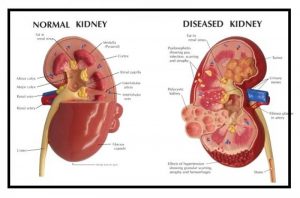The treatment will depend on the degree of chronic kidney disease.
In early stages it is important:
- Control blood pressure
- Monitor sugar, especially in people with diabetes
- Reduce the weight
- Control blood lipid levels
- Monitor the intake of protein, salt, liquids, potassium and phosphorus to avoid overloading the impaired function of the kidney.
If the disease progresses and reaches the situation of terminal renal failure or stage 5, a substitute treatment should be considered: kidney transplant or dialysis or opt for conservative medical treatment.
Substitute treatment of Chronic Renal Failure
At all times the patient is the one who, together with the best nephrologist in Delhi, decides how to manage their illness. The choice of one modality or another must be made after receiving detailed information on each of the options, with the aim of making the treatment as best as possible adapted to the patient’s lifestyle, preferences and health status.
The first decision is to choose a treatment that performs some of the renal functions (renal replacement therapy) or a treatment that manages the symptoms of kidney disease (conservative treatment).
Kidney transplant
Kidney transplantation involves receiving a kidney that will make it possible to replace the functions that have been lost due to kidney failure.
There are two types of kidney transplant in Delhi depending on the origin of the donor’s kidney:
- The kidney transplant from a living donor: In this case, the donors are usually relatives of the sick person: spouse, parents, siblings or someone close to the family. The advantage of this type of transplant is that it can be performed when the kidney disease is already highly evolved without needing even dialysis.
- Kidney transplant from cadaver donor: In this case the donor is deceased, and the recipient can hardly be transplanted before having dialysis for a certain period of time, whose duration will depend on the clinical characteristics of the patient, the blood group and age. The patient is included in a waiting list for a transplant, so that, at the time that a donation occurs, he can receive the kidney most suited to his characteristics.
Before performing the transplant, an exhaustive study of the patient with chronic kidney disease is performed to rule out medical situations that discourage it. Keep in mind that 45 people out of 100 (45%) cannot undergo a kidney transplant for medical reasons.
Patients with chronic kidney disease are included in a waiting list for transplants, during which period they must decide what type of dialysis they want to undergo hemodialysis or peritoneal dialysis.
Approximately 33 people out of every 100 who undergo dialysis are on the waiting list for a transplant. Of those 33 people, around 15 will receive the transplant.
After renal transplantation, the patient must strictly follow a lifelong treatment to avoid rejection of the kidney (immunosuppressants) and make periodic visits to kidney specialist in Delhi to ensure the proper functioning of the kidney and adjust the medication. according to the results of the analyses.
Sometimes, the transplanted kidney does not fulfill its function. On average, approximately 50 out of 100 people (50%) who have received a kidney from a cadaveric donor, the transplanted organ works for 15 years. In about 60 people out of every 100 (60%) who have received a kidney from a living donor, the transplanted kidney works an average of 15 years. People who suffer a transplanted kidney failure should decide between receiving another transplant, undergoing dialysis or conservative treatment.
The dialysis is a procedure used to replace part of the function of the kidneys. The patient receiving dialysis should combine it with other medications that suppress the functions of the kidney such as erythropoietin and vitamin D.
There are two types of dialysis (hemodialysis and peritoneal dialysis) that the patient should choose freely if there is no absolute contraindication for one modality or another.
The dialysis (in whatever form) is a treatment that should be done for life, unless renal function is restored, rare, or when accessing a successful kidney transplant situation.
Conservative treatment of Chronic Renal Failure
Conservative treatment is a plan used to treat the symptoms of end-stage renal disease with drugs, changes in lifestyle and other treatments.
That is, in this type of treatment, renal function is not replaced, dialysis is not done, and the patient’s damaged kidneys continue to deteriorate. In this way, the treatment allows the kidneys to continue functioning as long as the kidney disease allows.
The decision to opt for conservative treatment must be a decision agreed with the person and the family.
People who are offered conservative treatment, instead of a substitute treatment, have other medical problems or a delicate state of health such as being elderly, suffering from other serious or severely disabling diseases that offer a poor prognosis or have a life expectancy not very long.
It is possible that in these circumstances these people consider insufficient the benefits of dialysis for the management of their disease compared to the effort involved.
Numerous studies show that in patients with these characteristics, dialysis does not improve the prognosis, and with a conservative treatment they can improve their quality of life in the sense of having a greater control of hospital admissions; the number of emergency visits due to complications is reduced and invasive procedures with venous punctures or catheter placements are not performed.


